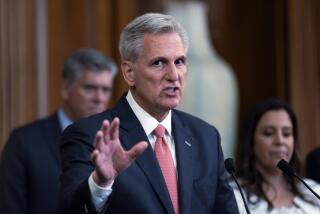Congress Gets Down to Election-Year Business
WASHINGTON — On its first full day of an election-year session, Congress on Wednesday began tackling a range of issues large and small despite the Capitol’s preoccupation with President Clinton’s private life.
From access to golf for the disabled to tax cuts, from how to spend any budget surplus to health care and education reform, Republicans and Democrats jockeyed for partisan advantage as they sought to create a record on which to campaign this fall.
Although few on Wednesday mentioned the sexual-misconduct allegations against Clinton, concern lurked that the controversy could hamper the ability of the White House and Congress to do the public’s business.
“It depends on how it all works out, how long it takes, what he says, what the truth is,” said Senate Majority Leader Trent Lott (R-Miss.). “It could get to be a distraction, to say the least, and an impediment at the worst.”
On the morning after Clinton’s State of the Union address, in which he urged Congress to use any budget surplus to “save Social Security first,” Republicans sought to take the policy offensive.
They hailed the president’s goal but expressed skepticism that he can use any budget surpluses to both strengthen Social Security and pay for what Republicans such as New Mexico Sen. Pete Domenici, Senate Budget Committee chairman, term “that long litany of new spending programs.”
Rep. Christopher Shays (R-Conn.) added: “Saving Social Security first is a bold move . . . [But] that means that new spending for [Clinton’s] initiatives must be paid for by reductions in other parts of the budget.”
Precise details of Clinton’s proposed budget will not be known until he submits the document next week.
Domenici said Republicans would like to use some of any budget surplus to finance a tax cut.
Rep. Bill Archer (R-Texas), chairman of the Ways and Means Committee, added: “There is room both to save Social Security and to protect Americans from high taxes.”
The GOP tax-cut fever prompted Rep. Charles B. Rangel of New York, the top Democrat on the Ways and Means Committee, to snap: “The Republican agenda just boils down to tax cuts, tax cuts, tax cuts--spending money that only exists in some economic theory. . . . “
The Ways and Means Committee held a hearing Wednesday to spotlight the so-called “marriage tax penalty” and the inheritance tax, which Republicans would like to abolish.
Calling attention to provisions that cause many married couples to pay higher taxes than two unmarried people living together, committee Republicans invited an Indiana couple to testify. Sharon Mallory and Darryl Pierce said they would “very much like to be married” but “it broke our hearts” upon learning that, if married, Mallory would lose her expected $900 tax refund; instead, they would owe the government $2,800.
On a related tax issue, Commissioner Charles Rossotti of the Internal Revenue Service told the Senate Finance Committee that he intends to reorganize the much-maligned agency, establish new performance measures and upgrade technology.
Still, Rossotti was given a less-than-warm welcome. Lott, a committee member, told him: “I will be honest with you--you run an agency I don’t like, and that I wish did not exist.”
Meanwhile, Sen. Edward M. Kennedy (D-Mass.) was joined by fellow congressional liberals to discuss their intention to push through another increase in the minimum wage over a three-year period to $6.65 an hour by Sept. 1, 2000. The last increase was passed by Congress two years ago. It currently is $5.15 an hour.
Not everyone harbored such far-reaching goals on Wednesday.
Retired Senate Majority Leader Bob Dole, the 1996 Republican presidential candidate, came to Capitol Hill to speak at a press conference called by Sen. Tom Harkin (D-Iowa) to exert public pressure on the Professional Golfers Assn. to allow golfer Casey Martin to ride in a cart during tournaments.
Martin, 25, a Stanford graduate, has a painful congenital circulatory condition that makes walking difficult. His lawsuit against the PGA is scheduled to go to trial Monday in Eugene, Ore.
“It all comes down to a question of fairness,” said Dole, one of the most prominent Americans with a disability.
More to Read
Sign up for Essential California
The most important California stories and recommendations in your inbox every morning.
You may occasionally receive promotional content from the Los Angeles Times.










